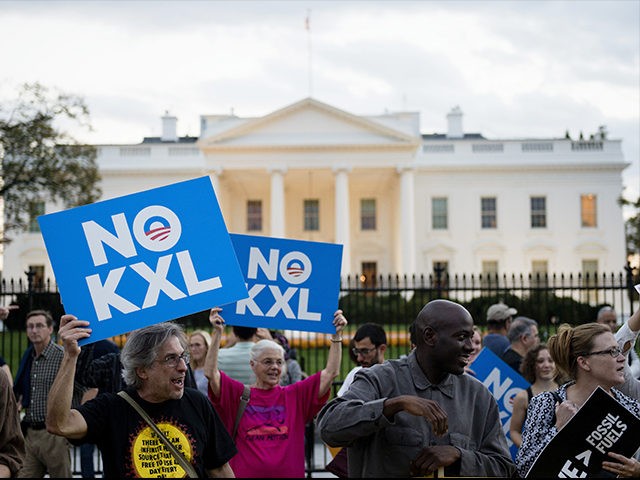The House Committee on Science Space and Technology released a report on Thursday detailing how Russia has been using social media platforms to disrupt domestic energy markets and influence domestic energy policies.
The 21-page report includes Russian posts on Twitter, Facebook, and Instagram, some with photographs and slogans.
“The committee began investigating Russian attempts to influence U.S. energy markets in the summer of 2017 when Chairman [Lamar] Smith wrote [to] the Secretary of Treasury regarding Russia’s intricate money-laundering scheme. Russian-sponsored agents funneled money to U.S. environmental organizations in an attempt to portray energy companies in a negative way and disrupt domestic energy markets,” the report states.
“Upon discovering that Russia may have exploited American social media platforms to accomplish its disruptive objectives, the committee broadened the scope of its investigation,” the report outlines. “On September 26, 2017, the Committee requested data from Facebook and Twitter as part of this expanded investigation.”
The documents social media companies provided to the committee confirm Russia’s influence peddling, according to the report.
The report also includes an article posted on the Buzzfeed News website that revealed how the Russians used Instagram to influence Native Americans on oil and gas pipelines, including the Dakota Access Pipeline, the site of Native American protests.
Smith requested more information about Russian actvity from social media companies last October, according to the report.
“The committee received and reviewed the companies’ produced documents for evidence of Russian influence,” the report states. “Twitter, Facebook, and Instagram were able to identify Russian accounts linked to the Internet Research Agency (IRA), a Russian company based in Saint Petersburg established by the Russian government for the purpose of deceptively using various social and traditional media platforms to advance Russian propaganda.”
“The information received from Twitter, Facebook, and Instagram shows that Russian agents indeed sought to disrupt U.S. energy markets and influence domestic energy policy by exploiting American social media platforms,” the report states.
Some of the key findings of the report include:
• Between 2015 and 2017, there were an estimated 9,097 Russian posts or tweets regarding U.S. energy policy or a current energy event on Twitter, Facebook, and Instagram.
- Between 2015 and 2017, there were an estimated 4,334 IRA accounts across Twitter, Facebook, and Instagram.
- According to information provided by Twitter, more than four percent of all IRA tweets were related to energy or environmental issues, a significant portion of content when compared to the eight percent of IRA tweets that were related to the election in the U.S.
- The IRA targeted pipelines, fossil fuels, climate change, and other divisive issues to influence public policy in the U.S.
The report also reveals that Russia wants to disrupt the cutting edge technology that has resulted in an American domestic energy renaissance, including horizontal drilling and hydraulic fracturing or fracking.
“Horizontal drilling and hydraulic fracturing as a means for producing oil and natural gas began in the early 2000s,” the report states. “At that time, there were “approximately 26,000 hydraulically fractured wells” in the United States, which accounted for ‘less than 7%’ of all U.S. marketed natural gas. By 2011, fracking had become the primary method for oil and natural gas development in the United States.”
“Since 2014, fracked wells have ‘accounted for most of all new wells drilled and completed,’” the report states. “The number of fracked wells had climbed ‘to an estimated 300,000’ by 2015, and were responsible for approximately 67 percent of all U.S. natural gas output.”
“In January 2017, the Office of the Director of National Intelligence released a report that contained “clear evidence that the Kremlin is financing and choreographing anti-fracking propaganda in the United States,” the report states.
The report also highlights how U.S. energy exports reaching the global marketplace is a threat to Russia’s dominance in some of those markets. For example, according to the report, Poland recently signed a five-year agreement with the United States to import liquefied natural gas into the country “in an attempt to decrease dependency on Russian energy supplies.”
Climate change is also an issue the Russians are exploiting on social media, according to the report.
Numerous Russian posts focused on the ongoing debate about climate change by linking catastrophic weather events to climate change and divisively labeling one viewpoint as right and one as left,” the report states. “One post characterizes Americans as ignoring major events that are allegedly signs of climate change.
Additionally, these posts frame the conservative viewpoint regarding climate change as a ‘liberal hoax, all in an effort to generate further domestic controversy surrounding the issue of climate change.
The report concludes:
The Committee will continue its ongoing efforts to identify foreign interference in domestic energy policy, whether from Russia or any other country so that the American people can formulate their positions based on facts rather than foreign propaganda.
Follow Penny Starr on Twitter

COMMENTS
Please let us know if you're having issues with commenting.